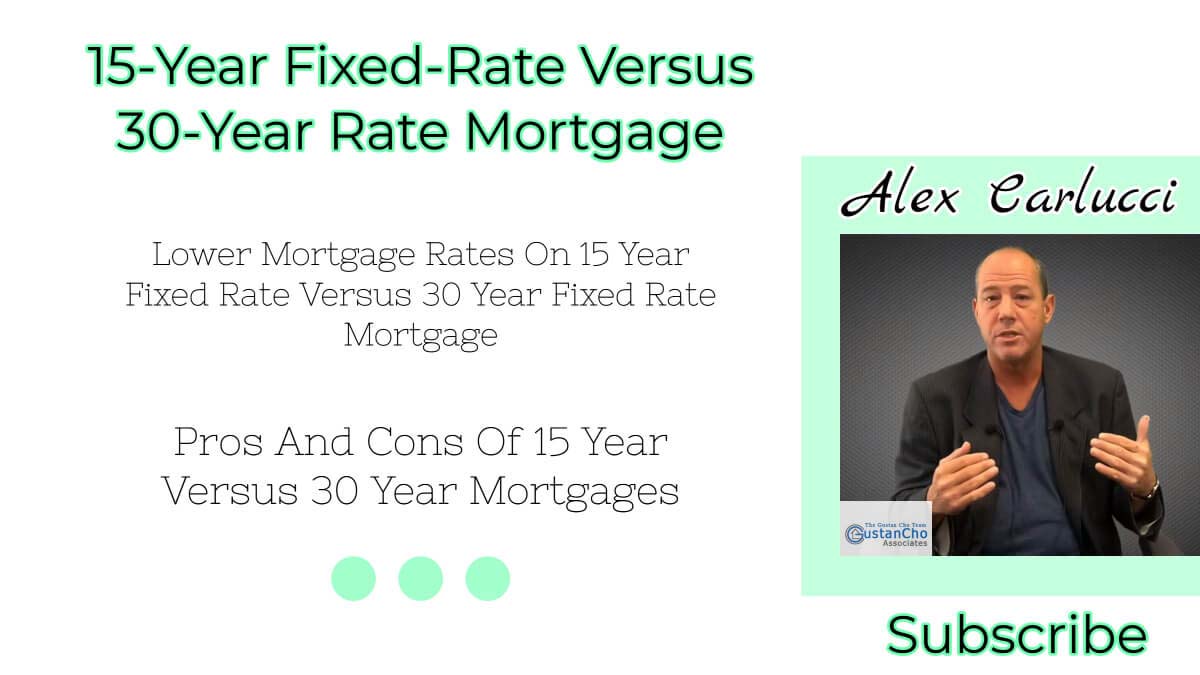15-Year Versus 30-Year Fixed-Rate Mortgage Comparison
When it’s time to buy a home or refinance, one of the biggest decisions you’ll face is choosing between 15-year versus 30-year fixed-rate mortgage. Both options have their pros and cons, and the best choice will depend on your goals, budget, and long-term financial plans. This guide will help you compare the two so you can make the smartest decision for your future.
What Is a Fixed-Rate Mortgage?
A fixed-rate mortgage means your interest rate and monthly interest and principal payments stay the same throughout the life of the loan. No surprises. No rate increases. Just predictable payments you can plan around whether you choose a 15-year or 30-year term. In the paragraphs below, we will further discuss 15-year versus 30-year fixed-rate mortgage comparison.
15-Year Versus 30-Year Fixed-Rate Mortgage Comparison
| Feature | 15-Year Fixed | 30-Year Fixed |
|---|---|---|
| Loan Term Length | 15 years | 30 years |
| Monthly Payment | Higher | Lower |
| Total Interest Paid | Less | More |
| Interest Rate | Lower | Slightly Higher |
| Builds Home Equity | Faster | Slower |
| Flexibility for Other Goals | Less | More |
15-Year Versus 30-Year Fixed-Rate Mortgage Monthly Payment Comparison
Because a 15-year mortgage repays the loan in half the time, the monthly payment is higher than a 30-year mortgage even though the interest rate is lower. Example (Assuming a $300,000 loan amount): 15-year fixed at 5.5%: ~$2,452/month. For 30-year fixed at 6.0%: ~$1,799/month. Note that taxes, insurance, and other costs would add to these payments.
Not Sure Whether to Choose a 15-Year or 30-Year Mortgage?
Contact us today to explore the pros and cons of both and find out which mortgage term is best for your financial goals.
Lower Mortgage Rates On 15-Year Versus 30-Year Fixed-Rate Mortgage
Homeowners can choose a 15-year versus 30-year fixed-rate mortgage. Borrowers can make extra monthly payments and get the loan paid in full in 15 years. However, mortgage rates on 15-year term loans are generally lower than 30-year fixed-rate mortgages. However, mortgages usually have the advantage of lower interest rates and the interest payments are usually tax-deductible for a normal family home.
Interest Savings Over Time 15-Year Versus 30-Year Fixed-Rate Mortgage
Who has more interest savings over time? 15-year versus 30-year fixed-rate mortgage? The real magic of a 15-year loan is in how much less interest you pay overall. For 15-year mortgage you could save a lot in interest compared to a 30-year mortgage. For 30-year mortgage you’ll pay more total interest over time but you’ll also have more room in your monthly budget.
Building Home Equity Faster: 15-Year Versus 30-Year Fixed-Rate Mortgage
15-year borrowers build equity quickly because more of each payment goes toward principal early on. 30-year borrowers build equity more slowly because interest payments dominate the early years. Equity can be important if you plan to refinance, take out a home equity loan, or sell your home later.
Benefits of 15-Year Fixed-Rate Mortgages
A 15-year fixed-rate mortgage can be a smart choice for homeowners who want to pay off their homes faster and save a lot of money on interest. While the monthly payments are higher compared to a 30-year loan, the long-term benefits can be significant. Here’s why many borrowers choose a 15-year mortgage:
- Lower Interest Rates: 15-year mortgages typically come with lower interest rates than 30-year loans. Lenders offer better rates because shorter loans are seen as less risky. Even a 0.5% to 1% lower rate can make a big difference over time. You pay less in interest every single month and over the life of the loan.
- Build Home Equity Faster: A larger portion of each of the monthly payment goes toward paying down your principal balance (not just interest). This helps you build equity in your home much faster than with a longer loan term. You own more of your home sooner, giving you more financial flexibility if you ever want to refinance, sell, or borrow against your equity.
- Save Tens of Thousands in Interest: Paying off your loan in 15 years versus 30 years means you pay far less in total interest. In many cases, homeowners save tens of thousands of dollars (or more) compared to a 30-year mortgage. Huge long-term savings that can be redirected toward retirement, investments, or other financial goals.
- Become Mortgage-Free Sooner: Paying off your mortgage in just 15 years means you can be debt-free much earlier. Imagine being free of a house payment by your 40s, 50s, or early 60s! More peace of mind, financial security, and the ability to enjoy retirement or other life plans without a mortgage weighing you down.
- Predictable Monthly Payments: Like all fixed-rate mortgages, a 15-year loan locks in your principal and interest payments for the life of the loan. You don’t have to worry about rising interest rates impacting your monthly budget. Stability and predictability, making it easier to plan your finances year after year.
- Bonus: Potentially Pay Off Other Debts Faster
With your home paid off sooner, you free up cash that can be used to boost retirement savings, pay off credit card debt, and invest in real estate or other opportunities Because of these more financial freedom and a stronger overall financial position.
Benefits of 30-Year Fixed-Rate Mortgages
A 30-year fixed-rate mortgage is still one of the most popular home loan options and for good reason. It offers long-term stability, lower monthly payments, and financial flexibility for many borrowers. Here’s a closer look at the major benefits of choosing a 30-year fixed mortgage:
- Lower Monthly Payments: Because the loan is spread out over 30 years, your monthly payments are much lower compared to a 15- or 20-year loan. This makes homeownership more affordable, especially if you’re buying a more expensive property or managing other financial obligations. As a result, easier monthly budgeting and less financial strain.
- Predictable Payments for the Life of the Loan: With a fixed-rate mortgage, your interest and principal payments stay the same for 30 years no matter how the market changes. You’re protected against rising interest rates. Long-term stability and peace of mind when planning your future expenses.
- Financial Flexibility: Lower payments mean you can use your extra cash for other goals, like building an emergency fund, saving for retirement, investing, and paying off high-interest debts (like credit cards). Because of these, there will be more room in your budget to grow your overall financial health.
- Easier Qualification for First-Time Buyers: Because monthly payments are lower, a 30-year mortgage can help you qualify for a larger amount loan based on your debt-to-income (DTI) ratio. This is especially helpful for first-time buyers entering the market. Access to more home options without overextending yourself.
- Option to Pay Extra and Pay Off Early: Even with a 30-year loan, you can make extra payments toward the principal whenever you want. This lets you reduce your balance faster and save on interest without being locked into a higher required payment. Flexibility to act like you have a 15- or 20-year loan when you want to, but not when you can’t.
- Bonus: Cushion for Economic Uncertainty: If your income fluctuates (commission-based, self-employed, or gig worker), a lower monthly payment provides important breathing room. In uncertain economic times, having manageable housing expenses can be a huge advantage. Better resilience against life’s financial ups and downs.
15-Year or 30-Year Fixed-Rate Mortgage? Let’s Find the Best Option for You!
Reach out now to discuss which mortgage term fits your budget and homeownership goals.
Pros and Cons of a 15-Year Mortgage:
Pros:
- Lower interest rates
- Big interest savings
- Own your home outright much sooner
- Build equity faster
Cons:
- Higher monthly payments
- Less flexibility in your budget
- May qualify for a smaller loan amount
Pros and Cons of a 30-Year Mortgage
Pros:
- Lower monthly payments
- Easier to qualify for a larger loan
- More financial flexibility (save for retirement, emergencies, etc.)
Cons:
- Higher interest rates
- More interest paid over time
- Slower equity building
How to Choose Between 15-Year Versus 30-Year Fixed-Rate Mortgage?
To choose between 15-year versus 30-year fixed-rate mortgage, ask yourself, what’s more important to me, lower payments or paying off my home faster? Can I comfortably afford the higher payment of a 15-year loan without stretching my budget? Do I need extra cash flow each month for savings, retirement, or unexpected expenses? How long do I plan to stay in the home? If you want flexibility or plan to move within a few years, a 30-year mortgage might make more sense. If you have stable income and want to save the most on interest, a 15-year mortgage could be a smart move.
Which Is Best For Homeowner 15-Year Versus 30-Year Fixed-Rate Mortgage?
The above mortgage term options may or may not fits the homeowner’s needs, depending upon their personal financial situation. A 30-year term might enable homeowners to buy a larger home or it might even be necessary to buy a home at all! The main differences between a 15 or 30 year fixed rate mortgage are that you can buy a larger home or pay less each month for over 30 years, but you can own your home 15 years sooner over a 15-year mortgage term. There are alternative mortgage term options but these are the most common.
Frequently Asked Questions: 15-Year versus 30-Year Fixed-Rate Mortgage
1. What’s the main difference between 15-year versus 30-year fixed-rate mortgage?
The main difference is the loan term length. A 15-year fixed-rate mortgage is paid off much faster than a 30-year mortgage, resulting in larger monthly payments but major savings in total interest.
2. Which loan has the lower monthly payment, 15-year versus 30-year fixed-rate mortgage?
A 30-year fixed-rate mortgage has lower payments monthly because the repayment period is stretched over a longer time. A 15-year mortgage has higher monthly payments but pays off the loan much faster.
3. Which option saves more money over time 15-year versus 30-year fixed-rate mortgage?
The 15-year mortgage saves you more money over time. You’ll pay less in total interest, often tens of thousands of dollars less compared to a 30-year mortgage.
4. Do 15-year mortgages always have lower interest rates than 30-year mortgages?
Yes, typically 15-year loans come with lower interest rates than 30-year loans. Lenders offer better rates because the loan is paid back faster, making it less risky.
5. Is it harder to qualify for a 15-year mortgage?
It can be. Because the monthly payment is higher, you’ll need to show a higher income or have a lower debt-to-income (DTI) ratio to qualify compared to a 30-year loan.
6. Can I get a 30-year mortgage and pay it off in 15 years?
Yes! You can choose a 30-year mortgage for the flexibility of a lower required payment, and then make extra payments toward the principal to pay it off faster similar to a 15-year timeline if you stay consistent.
7. Is a 15-year mortgage better for first-time homebuyers?
It depends on your budget. First-time buyers often prefer the 30-year mortgage for lower payments and more affordability, but if you can comfortably afford higher payments, a 15-year mortgage can build equity faster and save you money long-term.
8. Which is better if I plan to retire soon 15-year versus 30-year fixed-rate mortgage?
Many borrowers aiming to retire soon choose a 15-year mortgage so they can pay off their home before retirement.
Being mortgage-free can greatly reduce living expenses in retirement.
9. Can I refinance from a 30-year to a 15-year mortgage later?
Absolutely. Many homeowners start with a 30-year mortgage and later refinance into a 15-year loan once their income increases or financial goals shift.
10. How do I decide which loan term is right for me 15-year versus 30-year fixed-rate mortgage?
Ask yourself, can I comfortably afford the higher payment of a 15-year loan? Do I want to prioritize saving on interest or having more flexibility in my budget How long do I plan to stay in the home? What are my other financial goals (saving for retirement, kids’ education, emergency funds)? Coordinating with a mortgage expert can help you review the numbers and find the best fit for your financial situation.
If you have further questions about 15-year versus 30-year fixed-rate mortgage or needs pre-approval, contact us today! At Gustan Cho Associates, we believe your mortgage should match your life not the other way around. Whether you’re looking for a low payment, flexibility, or financial breathing room, we have options for you. No lender overlays. Fast closings. Creative solutions for all borrower types.
Considering a 15-Year vs. 30-Year Fixed-Rate Mortgage?
Contact us now to get personalized advice and find out which option will work best for you.








